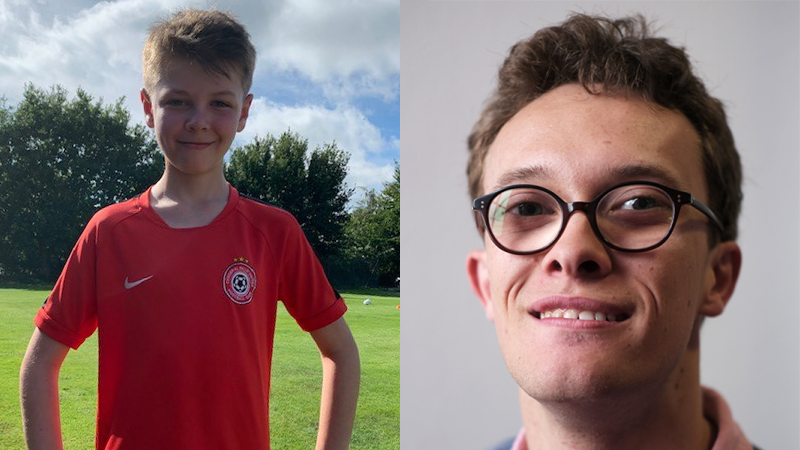My name is Bryan and I am 14 years old. I started playing Cerebral Palsy (CP) football at the age of 10 at my local pan-disability football club Doncaster Titans. I really enjoyed being part of this team because my teammates had similar needs to me and we could all compete with each other to improve our skills.
I always wanted to play for my country someday, so I looked into CP Football and found the then England captain Jack Rutter on the England football YouTube channel. Jack put me in touch with CP United Football Club, where I then started playing and which I love being a part of. My favourite part of being involved with disability football is the amazing people and friends I have met over the years and the amazing opportunities it has offered me, like visiting St George’s Park, Holland and Dublin! I also enjoy raising awareness and inspiring others to get involved with disability sport.
Just before lockdown the game was gaining some real momentum, so I’m really looking forward to getting back to playing as soon as it is safe. Lockdown has been difficult for us all and I have really missed my coaches and teammates. I have used this lockdown to improve my individual skills and also put together a few CP specific videos to help others keep fit and active.
Once I got used to home learning I enjoyed it and think it has helped me with being more organised and focused. It has been great to get back to school though and see my friends, teachers and sports teams. This school year is my first year studying sports science and I have enjoyed learning and putting my experience with disability football into my assignments.
Both my teachers and coaches have been great and really listened to all our needs during lockdown. My football club have been awesome in setting up regular video meetings, quizzes and other online activities to keep us all busy and connected. I have shared my experience of disability sport with my school to show my classmates that anything is possible and to encourage them to try something new.
I organised a day of disability sports with my PE teachers in my local primary school for kids to try them out and see how much fun and how competitive they can be. I even asked the current CP England football captain Matt Crossen to come into school and do a presentation on his football journey and what he has achieved in the game. It was great to see him talk about football world cups and Paralympic Games with the rest of the school.
If you want to make sport more inclusive for young people with CP at your school, check out our top tips:
- Remember that everybody is different
Everyone with CP is different, so don’t try to categorise everyone into the same box. - Don’t shy away from it – talk to the young person
Young people with CP know their disability better than anyone else. Have a conversation about what they can do and what they may need help with. Listen to young people’s experiences - Involve everyone
The best activities involve everyone as then everyone gets to benefit from them. Why not host an Inclusion 2020 Learning and Discovery festival? - Adapt the equipment
One way to involve everyone is to change the equipment to make sure everyone can take part. For example, this might include using a balloon instead of a ball or thinking about the space you have available. - Consider wheelchairs, walkers and standing
People with CP have very different levels of mobility, from power chairs they control with their head to walking with a splint. It is important that sport caters for people with all mobility needs. - Think about how you can use sport to develop skills
Sport can be a great way of developing skills that people with CP may find hard. For example, hand eye coordination can be helped through hitting a ball with a bat. - Use sport to build confidence and social skills
Sport isn’t just about the physical, it’s the chatting at the start and at the end of a game, meeting new people and making friends. It provides lots of opportunities to develop confidence and social skills. - Make sure facilities are accessible
It is very important that the facilities around the sporting activity are accessible for all, so think about the building, toilets and café. - Don’t forget the power of fun
It’s vital to ensure that everyone is having fun when they are playing sport – they’re more likely to return if they’re enjoying it. - Raise awareness of disability sport
Highlight organisations and athletes who take part in disability sport and share their stories to show the importance of inclusion in sport and inspire young people with disabilities to get involved. Encourage students to explore sporting events such as the Paralympic Games.
You can find these top tips in a downloadable document, plus lots of other tips for ensuring sport is inclusive here.

